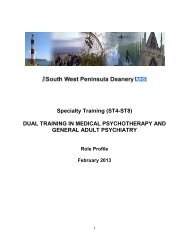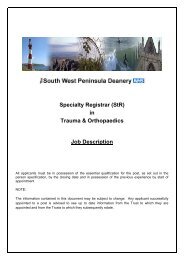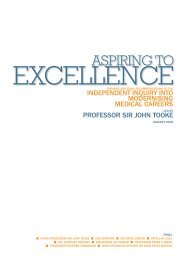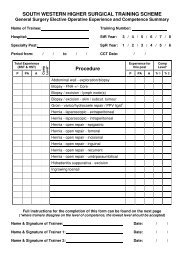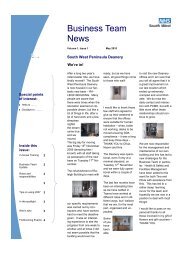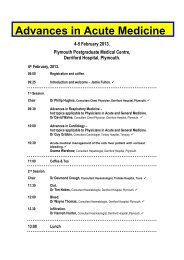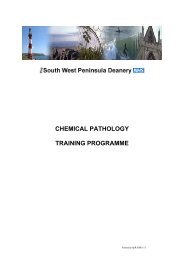A Guide to Core Psychiatry (CPT) Workplace Based Assessments ...
A Guide to Core Psychiatry (CPT) Workplace Based Assessments ...
A Guide to Core Psychiatry (CPT) Workplace Based Assessments ...
You also want an ePaper? Increase the reach of your titles
YUMPU automatically turns print PDFs into web optimized ePapers that Google loves.
A <strong>Guide</strong> <strong>to</strong> <strong>Core</strong> <strong>Psychiatry</strong> (<strong>CPT</strong>) <strong>Workplace</strong> <strong>Based</strong><br />
<strong>Assessments</strong> (WPBAs) & ARCP<br />
Competence Attainment<br />
All trainees will have an Annual Review of Competence Progression (ARCP) organised by<br />
their deanery. This is described in the Gold <strong>Guide</strong> and replaces the RITA process. The key<br />
elements of this review are:<br />
Appraisal<br />
i. Educational<br />
ii. NHS<br />
Assessment of performance<br />
i. <strong>Workplace</strong> <strong>Based</strong> <strong>Assessments</strong> (WBAs)<br />
ii. Experience demonstrated e.g. from portfolio including audit, research and<br />
other aspects of non-clinical competence<br />
Planning<br />
Achievement of competencies will be considered in the Educational Supervisor’s Report and<br />
the Educational Supervisor will consider WPBA and other evidence such as examinations<br />
passed and experiential outcomes recorded in the portfolio. The competencies will be<br />
considered under 11 domains:<br />
i. Providing a good standard of practice and care<br />
ii. Decisions about access <strong>to</strong> care<br />
iii. Treatment in emergencies<br />
iv. Maintaining good medical practice<br />
v. Maintaining performance<br />
vi. Teaching and training, appraising and assessing<br />
vii. Relationships with patients<br />
viii. Dealing with problems in professional practice<br />
ix. Working with colleagues<br />
x. Maintaining probity<br />
xi. Ensuring that health problems do not put patients at risk<br />
Underlying Principles of <strong>Workplace</strong> <strong>Based</strong> <strong>Assessments</strong><br />
<strong>Workplace</strong> based assessments must comply with the following:<br />
They must focus on performance (i.e. what you actually do in the workplace)<br />
They must be evidence based<br />
Evidence must be triangulated whenever possible (i.e. it must be provided by<br />
different assessors, on different occasions, and if possible using different methods)<br />
Records must be permanent – assessment forms must not be lost or destroyed (this<br />
is achieved by online s<strong>to</strong>rage).<br />
Purpose of <strong>Workplace</strong> <strong>Based</strong> <strong>Assessments</strong><br />
The purpose of the workplace based assessments is twofold:<br />
Firstly, they have a formative function as the basis for feedback and educational<br />
planning. This helps included helping identify any specially focused teaching and<br />
learning that might be necessary <strong>to</strong> fill gaps or resolve weaknesses. You should have
WPBAS completed regularly throughout your placement <strong>to</strong> demonstrate effective review<br />
and appraisal. Therefore, do not leave them until the end of each stage of training or<br />
clinical placement.<br />
Secondly, although individually they have no ‘pass’ or ‘fail’ score, taken <strong>to</strong>gether WPBAs<br />
contribute <strong>to</strong> the Annual Review of Competence Progression (ARCP), which has a<br />
summative function providing evidence of the attainment of competencies. Successful<br />
completion of the ARCP process is manda<strong>to</strong>ry for eligibility for the MRCPsych<br />
examinations.<br />
Type of <strong>Workplace</strong> <strong>Based</strong> <strong>Assessments</strong><br />
There are 8 workplace based assessments currently available. These are described in detail<br />
in the trainee and assessor guidance for each WPBA <strong>to</strong>ol and are merely outlined below.<br />
Assessment of Clinical Expertise (ACE)<br />
The assessor observes a whole new patient encounter in order <strong>to</strong> be able <strong>to</strong> assess<br />
your ability <strong>to</strong> take a full his<strong>to</strong>ry and mental state examination and arrive at a diagnosis<br />
and management plan.<br />
Mini-Assessed Clinical Encounter (mini-ACE)<br />
The assessor observes part of a patient interaction, for example his<strong>to</strong>ry taking or<br />
negotiating a treatment plan, and rates your performance.<br />
Case-based Discussion (CbD)<br />
You select two sets of notes of patients you have recently seen and the assessor picks<br />
one <strong>to</strong> discuss. The discussion will allow demonstration of clinical decision-making and<br />
the application of clinical knowledge.<br />
Case Presentation (CP)<br />
This <strong>to</strong>ol can be used when you give clinical presentations and involves assessment of<br />
domains such as presentation skills and interpretation of evidence.<br />
Journal Club Presentation (JCP)<br />
This can be used when you present a journal article and covers domains such as<br />
analysis and critique and answering questions.<br />
Directly Observed Procedural Skills (DOPS)<br />
This has more limited use in psychiatry compared <strong>to</strong> other areas of medicine but can<br />
used in situations such as administering ECT.<br />
Mini-Peer Assessment Tool (mini-PAT)<br />
It allows co-workers <strong>to</strong> assess your attitudes and behaviours and ability <strong>to</strong> work well with<br />
colleagues.<br />
Assessment of Teaching (AoT)<br />
This is a new <strong>to</strong>ol that has been developed after feedback from the pilot programme. It<br />
allows an assessment <strong>to</strong> be made of teaching skills and may relate <strong>to</strong> a lecture, tu<strong>to</strong>rial<br />
or small group teaching session that you lead.<br />
Carrying out <strong>Workplace</strong> <strong>Based</strong> <strong>Assessments</strong><br />
You are responsible for organising your assessments. You should discuss the areas in<br />
which you need <strong>to</strong> be assessed with your Educational Supervisor and plan your WPBAs<br />
accordingly. Remember that you will need <strong>to</strong> be assessed by a range of different assessors<br />
in different situations <strong>to</strong> ensure triangulation of evidence. Don’t rely on your Educational<br />
Supervisor <strong>to</strong> perform all the assessments! Also remember that you must ask for the<br />
patient’s agreement when you perform a WPBA that involves a patient.<br />
There is an online system for the completion and s<strong>to</strong>rage of WPBAs. You can register for<br />
this through the College website and it can be accessed at http://training.rcpsych.ac.uk/.<br />
After you register you will be able <strong>to</strong> access the forms relevant <strong>to</strong> the manda<strong>to</strong>ry WPBAs (ie
ACE, mini-ACE, CbD and mini-PAT). Your assessors must then complete these<br />
assessments online.<br />
<strong>Workplace</strong> <strong>Based</strong> Assessment Requirements<br />
The learning needs of individual trainees will determine which competencies they need <strong>to</strong> be<br />
assessed in and the number of assessments that need <strong>to</strong> be performed; the College<br />
Assessment Programme’s eligibility structure should be regarded as a minimum number.<br />
Briefly, the number of WPBA’s stipulated in the Assessment Programme for CT1 and ST2&3<br />
is as follows<br />
Minimum Number required per year<br />
WPBA CT1 CT2 / ST2 CT3 / ST3<br />
Ace 2 3 3<br />
Mini-ACE 4 4 4<br />
CbD 2 2 2<br />
mini-PAT* 2 2 2<br />
Recommended Number per year<br />
WPBA CT1 CT2 / ST2 CT3 / ST3<br />
CP 1 1 1<br />
JCP 1 1 1<br />
DOPS<br />
As the opportunity arises<br />
AoT<br />
As the opportunity arises<br />
*There will be 5 rounds of mini-PAT’s per year of which 2 must be completed<br />
The guidelines in the above tables should be regarded as the minimum number of<br />
WPBAs: many trainees will need <strong>to</strong> do more, for example <strong>to</strong> provide additional evidence of<br />
achievement in a particular area of professional practice. It is important <strong>to</strong> again note that<br />
there is no ‘pass’ or ‘fail’ score for WPBA.<br />
You must note that, since they form the basis for feedback and educational planning, you<br />
must arrange WPBAs at appropriate intervals throughout your training rather than leaving<br />
them until the end of each stage. In particular, we strongly suggest that within the early<br />
stages of each phase of training or clinical placement (i.e. within the first month) you<br />
undertake a mini-ACE or ACE and a CbD. This is because these <strong>to</strong>ols reflect closely the<br />
expected day-<strong>to</strong>-day work of a psychiatric trainee both in terms of the assessment of cases<br />
and clinical reasoning and judgement. The purpose of these early assessments is <strong>to</strong> identify<br />
what you are doing well and in which areas you need <strong>to</strong> develop. They contribute valuable<br />
information <strong>to</strong> the educational planning of your placement. Therefore it is most unlikely that<br />
assessments made early will produce ratings consistent with performance at the standard<br />
expected for the completion of the stage of training.<br />
Educational Supervisors Report / College Tu<strong>to</strong>r’s Report<br />
The Educational Supervisor’s Report and the College Tu<strong>to</strong>r’s Report will be submitted for<br />
consideration by the ARCP. It is the ARCP that validates the achievement of competence<br />
after considering the presented portfolio information. It is important <strong>to</strong> note that as the ARCP
considers a range of evidence, it is possible for you <strong>to</strong> have performed well in your WPBAs<br />
but be considered by the ARCP panel <strong>to</strong> require further development. The outcomes for<br />
ARCP are described in the Gold <strong>Guide</strong> http://www.mmc.nhs.uk/Docs/A <strong>Guide</strong> <strong>to</strong><br />
Postgraduate Specialty Training in the UK (Gold <strong>Guide</strong>).doc<br />
Portfolio<br />
This replaces the previous College logbook. It allows you <strong>to</strong> collate other evidence in<br />
addition <strong>to</strong> your WPBA. A template can be found here on the Royal College of Psychiatrists<br />
Website:<br />
http://www.rcpsych.ac.uk/docs/Portfolio framework - May 2008 (2).doc<br />
This document is intended <strong>to</strong> provide a framework from which trainees can build a portfolio<br />
of evidence of their progress and attainment. It should be modified and adapted <strong>to</strong> suit<br />
individual training needs. Duplicate pages of each section should be created as necessary.<br />
This framework should be used electronically and updated regularly. It can then be printed<br />
out when necessary, for example for the Annual Review of Competence Progression.<br />
Suggested timetable for submission of WPBA’s<br />
This is a suggested timetable for a trainee in a six-month placement; schedules for individual<br />
trainees will vary depending upon local requirements and the trainee’s needs.<br />
Month 1 Month 2 Month 3 Month 4 Month 5 Month 6<br />
SPECIFIC FORMS TO BE SUBMITTED DURING CERTAIN MONTHS<br />
Individual<br />
learning plan<br />
1st self<br />
appraisal<br />
It is<br />
recommended<br />
that one of the<br />
patient<br />
encounter<br />
forms (ACE or<br />
mini-ACE) is<br />
completed now<br />
*Self appraisal<br />
form for 3<br />
months<br />
*Mid term<br />
assessment<br />
form<br />
Mini-Peer<br />
Assessment<br />
Tool<br />
*Self appraisal<br />
form (month<br />
5)<br />
OVER THE 6 MONTH PERIOD<br />
Combination of ACE/Mini ACE/CbD – <strong>to</strong>tal of 4 forms <strong>to</strong> be submitted during 6 month rotation<br />
Case Conference Presentation – at least 1 form <strong>to</strong> be submitted every 12 months<br />
Journal Club Presentation - at least 1 form <strong>to</strong> be submitted every 12 months<br />
AoT should be completed as the opportunity arises<br />
DOPS (for the those carrying out ECT) submit until lead clinician is satisfied with progress<br />
*Where these are required by your Trust and/or Programme, also note your local arrangements for<br />
submission of the Educational Supervisor’s Structured Report and workplace based (NHS) appraisal<br />
ARCP Requirements
Trainees are required <strong>to</strong> complete the following in preparation of their ARCP assessment.<br />
1. WPBAs completed as directed above<br />
2. Educational Supervisor Form – 1 completed for each rotation (e.g. 2 posts in 12<br />
months = 2 reports)<br />
3. College Tu<strong>to</strong>r Form<br />
4. Evidence of Psychotherapy Development<br />
5. Evidence of PCT training<br />
6. Portfolio (completed in accordance with the Royal College of Psychiatrists Portfolio<br />
Guidance inc. results of WPBAs and Exam Certificates) Must include:<br />
i. Evidence of Clinical Activity (logbook)<br />
ii. Educational Plan<br />
iii. Evidence of MRCPsych attendance<br />
iv. Exam Sitting / Results / Certificates<br />
v. NHS Appraisal<br />
vi. Any other evidence<br />
7. Confirmation of completion of PMETB survey<br />
8. Form R<br />
9. Any other evidence that they feel will be beneficial <strong>to</strong> the ARCP process<br />
All the information must be presented <strong>to</strong> the trainees’ Educational Supervisor / College Tu<strong>to</strong>r<br />
at the Pre-ARCP meeting. The Educational Supervisors / College Tu<strong>to</strong>r will make a<br />
recommendation of Outcome <strong>to</strong> the ARCP panel. Failure <strong>to</strong> produce this information will<br />
result the Educational Supervisors / College Tu<strong>to</strong>r recommending <strong>to</strong> the panel that an<br />
Unsatisfac<strong>to</strong>ry Outcome be issued. The trainee will then be required <strong>to</strong> meet with the panel<br />
and discuss the missing evidence and agree future action.<br />
Paperwork Required for ARCP<br />
Trainees will be required <strong>to</strong> submit prior <strong>to</strong> the ARCP the following documentation:<br />
Educational Supervisors Report (signed copy with original being retained by the trainee)<br />
College Tu<strong>to</strong>r Report (signed copy with original being retained by the trainee)<br />
Trainees who attend a face <strong>to</strong> face ARCP will also be expected <strong>to</strong> bring the following with<br />
documentation for review:<br />
Portfolio – completed in accordance with the Royal College of Psychiatrists Portfolio<br />
Guidance inc. results of WPBAs and Exam Certificates<br />
Educational Supervisors Report (original copy)<br />
College Tu<strong>to</strong>r Report (original copy)<br />
Evidence of Psychotherapy Development<br />
Any other evidence they feel will be beneficial<br />
Key Contact Details<br />
Head of School of <strong>Psychiatry</strong><br />
Dr Kate Lovett
Training Programme Direc<strong>to</strong>rs<br />
Child and Adolescent <strong>Psychiatry</strong><br />
General and Old Age <strong>Psychiatry</strong><br />
Forensic <strong>Psychiatry</strong><br />
Dr Sarah Huline-Dickens<br />
Dr Giles Richards<br />
Dr Eluned Dorkins<br />
Clinical Tu<strong>to</strong>rs<br />
Cornwall Partnership Trust<br />
Devon Partnership Trust<br />
North Devon Partnership Trust<br />
Plymouth Partnership Trust<br />
South Devon Partnership Trust<br />
Dr David Cox<br />
Dr Charles Dixon<br />
Dr Alison Collins<br />
Dr David Bicker<strong>to</strong>n<br />
Dr San Sreenath<br />
Regional Advisor<br />
Regional Advisor - Peninsula<br />
Dr Mike Metcalfe<br />
Deanery Contacts<br />
School Manager<br />
School Administra<strong>to</strong>r<br />
Heather Rowley<br />
Carla Miners



